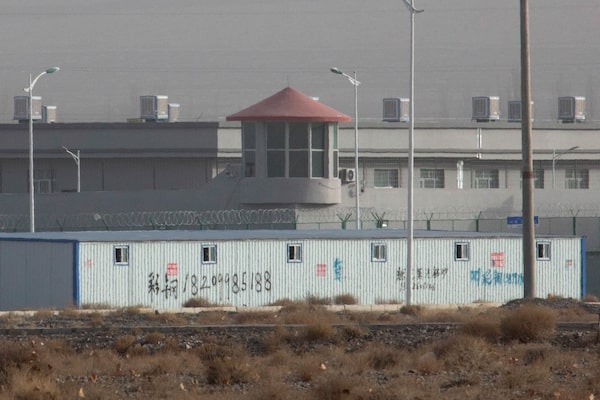
A guard tower and barbed wire fences are seen around a facility in the Kunshan Industrial Park in Artux in western China's Xinjiang region on Dec. 3, 2018.Ng Han Guan/The Associated Press
China’s mass detention of Uyghurs and other ethnic minorities in Xinjiang may amount to crimes against humanity, the United Nations human-rights office said in a long-delayed report published late Wednesday.
The 48-page report constitutes a damning indictment of China’s practices in Xinjiang, where it has cracked down heavily on Uyghurs and other predominantly Muslim groups in the name of fighting “extremism.” Since at least 2017, this campaign has resulted in “serious human rights violations,” the report said, with “interlocking patterns of severe and undue restrictions on a wide range of human rights.”
At the core of the alleged abuses is a vast system of “vocational education and training centres,” which China claims are focused on poverty alleviation and deradicalization, but former detainees and outside observers say are closer to prison camps, with people subject to indoctrination and mistreatment.
“Allegations of patterns of torture or ill-treatment, including forced medical treatment and adverse conditions of detention, are credible, as are allegations of individual incidents of sexual and gender-based violence,” the UN report said, which “would in themselves amount to acts of torture or other forms of ill-treatment.”
It said the extent of arbitrary and discriminatory detention of Uyghurs and other predominantly Muslim groups and deprivation more generally of fundamental rights “may constitute international crimes, in particular crimes against humanity.”
The report says its assessment is based on “China’s obligations under international human rights law” to prevent crimes against humanity – large-scale or methodical violence against a large number of victims.
It also found compelling evidence of coercion in China’s “surplus labour” programs, echoing previous findings by the International Labour Organization that have caused many countries to impose restrictions on products sourced from Xinjiang.
While the report does cite some interviews with former detainees, most of its sources are government documents and statements. Previous reporting on Xinjiang, including estimates that as many as a million people may have passed through the detention camp system, also largely drew on such primary sources, despite Beijing’s efforts to discredit any claims of abuses in the region.
That reporting has led some governments and parliaments, including Canada’s, to label the situation in Xinjiang a “genocide,” a term the UN report does not use, while emphasizing the credibility of the evidence drawn on by most assessments that reached this conclusion.
The UN human-rights office, headed by high commissioner Michelle Bachelet, has been investigating allegations of human-rights abuses in Xinjiang for years. The report released on Wednesday was initially to be published early last year, but was delayed for unspecified reasons.
In May, 2022, Ms. Bachelet visited China in a trip that raised severe concerns of a potential white wash. At a news conference, the former Chilean president focused more on human-rights abuses in the United States, and said she was “unable to assess the full scale” of the detention camp system.

Outgoing United Nations High Commissioner for Human Rights Michelle Bachelet gives a final press conference at the United Nations offices in Geneva on Aug. 25, 2022.FABRICE COFFRINI/AFP/Getty Images
Since then, Ms. Bachelet has faced intense criticism from Uyghur and human-rights groups, and calls for her office to publish the long-delayed report. Beijing has lobbied heavily behind the scenes and in public to prevent its release.
The report was published around midnight Geneva time, minutes before Ms. Bachelet’s term as high commissioner ended. In a departing address, she did not mention China, and warned “polarization within and among states has reached extraordinary levels, and multilateralism is under pressure.”
Sophie Richardson, China director at Human Rights Watch, said the UN’s “damning findings explain why Beijing fought tooth and nail to prevent publication of this report.”
“The United Nations Human Rights Council should use the report to initiate a comprehensive investigation into the Chinese government’s crimes against humanity targeting the Uyghurs and others – and hold those responsible to account,” she added.
In the report, the UN urged China to reverse its policies in Xinjiang and promptly investigate allegations of human-rights violations, while also recommending the international community “strengthen the protection and promotion of human rights in [Xinjiang] in follow-up to these recommendations.”
Beijing’s response to the UN’s findings was included in an annex published alongside Wednesday’s report, one almost three times as long, much of it focusing on alleged terrorist attacks in China seen as justification for deradicalization programs.
In an introduction, China’s permanent mission to the UN in Geneva said it “firmly opposes the release of the so-called ‘assessment of the human rights situation in the Xinjiang Uyghur Autonomous Region, China’ by the [Office of the United Nations High Commissioner for Human Rights].”
It accused the UN of relying on “disinformation and lies fabricated by anti-China forces” and said the assessment “runs counter to the mandate of the OHCHR, and ignores the human rights achievements made together by people of all ethnic groups in Xinjiang and the devastating damage caused by terrorism and extremism.”
Our Morning Update and Evening Update newsletters are written by Globe editors, giving you a concise summary of the day’s most important headlines. Sign up today.
 James Griffiths
James Griffiths